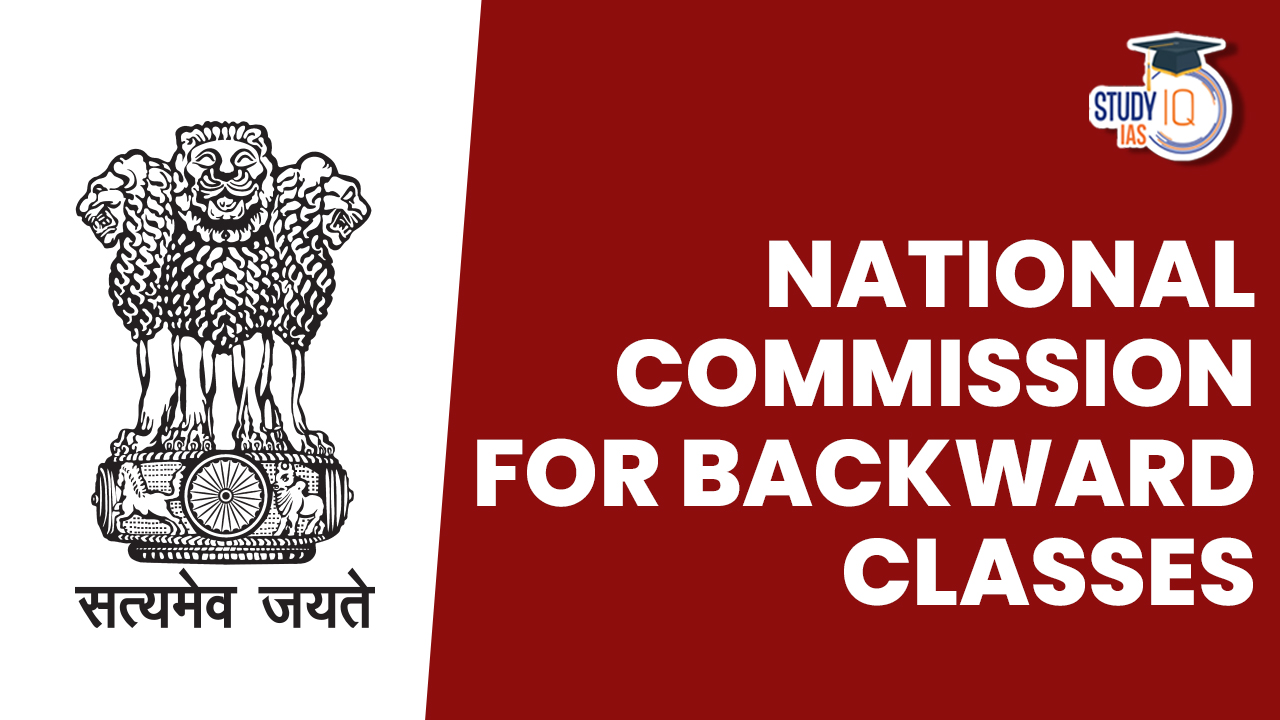Table of Contents
National Commission for Backward Classes (NCBC)
In a diverse and stratified society like India, ensuring social justice and equality is paramount. To address historical disparities and uplift marginalized sections of the population, the National Commission for Backward Classes (NCBC) was established. The NCBC plays a crucial role in identifying, classifying, and recommending welfare measures for socially and educationally backward classes. This article delves into the history, structure, constitutional provisions, powers and functions, and the formation of the NCBC.
|
National Commission for Backward Classes (NCBC) |
|
| National Commission for Backward Classes (NCBC) | Constitutional body |
| Year of formation |
|
| Constitutional Provisions regarding (NCBC) |
|
| Composition |
Among the members, there should be:
|
Background on Formation of National Commission for Backward Classes
During the 1950s and 1970s, two distinct Backward Class Commissions were established, led by Kaka Kalelkar and B.P. Mandal, respectively. Notably, the Kaka Kalelkar commission is often referred to as the First Backward Classes Commission.
In the pivotal 1992 Indra Sawhney case, the Supreme Court of India directed the government to establish a permanent entity tasked with evaluating, investigating, and recommending the inclusion or exclusion of various Backward Classes. This initiative aimed to ensure these classes receive appropriate benefits and protection.
In line with these instructions, the Indian Parliament enacted the National Commission for Backward Classes Act in 1993, leading to the establishment of the National Commission for Backward Classes (NCBC).
With the intent of more effectively safeguarding the interests of backward classes, the Parliament introduced the 123rd Constitution Amendment bill in 2017.
Furthermore, the Parliament passed a separate legislation to annul the National Commission for Backward Classes Act of 1993. This step rendered the 1993 act irrelevant following the passage of the new bill.
The new bill garnered the President’s assent in August 2018, thereby elevating the NCBC to a constitutional status. This significant development solidified the institution’s standing and role within the framework of the Indian Constitution.
Constitutional Provisions of National Commission for Backward Classes
- Article 340 of the Constitution addresses the necessity to identify “socially and educationally backward classes,” analyze the factors contributing to their backwardness, and suggest remedies to alleviate their challenges.
- The 102nd Constitution Amendment Act introduced novel Articles 338B and 342A, along with modifications to Article 366.
- Article 338B grants authority to the National Commission for Backward Classes (NCBC) to investigate grievances and welfare initiatives concerning socially and educationally backward classes.
- Article 342A confers upon the President the authority to designate socially and educationally backward classes within individual states and union territories. This designation process necessitates consultation with the respective State Governors. However, any modifications to the list of backward classes require the enactment of a law by the Parliament.
|
102nd Amendment to the Constitution (2018) |
| The 102nd Amendment to the Constitution in 2018 conferred constitutional status upon the National Commission for Backward Classes (NCBC), empowering it with the mandate to address issues related to socially and educationally disadvantaged groups. This amendment elevated the NCBC from its previous status as a statutory entity under the Ministry of Social Justice and Empowerment. The NCBC now possesses the authority to both investigate grievances and oversee the implementation of welfare initiatives targeting backward classes. |
Structure of National Commission for Backward Classes (NCBC)
The Commission is composed of:
- Chairperson
- Vice-Chairperson
- Three additional Members holding the rank and receiving the remuneration equivalent to that of a Secretary to the Government of India.
The terms of their employment and duration of their roles have been officially defined and communicated by the Ministry of Social Justice and Empowerment.
National Commission for Backward Classes Powers and Functions
The commission undertakes investigations and oversight pertaining to the safeguards established for socially and educationally backward classes as outlined in the Constitution or any other applicable legislation. This assessment aims to gauge the efficacy of these safeguards.
Furthermore, the commission actively engages in advising and participating in the socio-economic advancement of socially and educationally backward classes. This role includes evaluating the progress of their development within the framework of both the Union and individual States.
The commission is responsible for presenting reports to the President on an annual basis, as well as at other times deemed appropriate by the commission. These reports detail the functioning of the safeguards mentioned earlier. Subsequently, the President places these reports before both Houses of Parliament.
In cases where any part of such a report pertains to matters under the purview of State Governments, a copy of the report is forwarded to the respective State Government.
In addition to these functions, the NCBC is tasked with carrying out other responsibilities related to the safeguarding, welfare, development, and advancement of socially and educationally backward classes. The scope of these functions is determined by the President, subject to any relevant laws enacted by Parliament.
When acting in the capacity of a civil court during the trial of a lawsuit, the commission possesses the full extent of powers associated with such proceedings.
Significance of National Commission for Backward Classes
- The commission plays a vital role in upholding fairness for marginalized social and educational segments of society.
- By addressing concerns specific to disadvantaged groups, the commission actively promotes societal equity.
- It serves as a support for oppressed classes in their fight against injustices, ensuring prompt and impartial legal remedies.
- The commission respects the autonomy of state governments, as they can establish their own commissions for underprivileged groups.
- The National Commission for Scheduled Castes and the National Commission for Scheduled Tribes now share parity with the NCBC.
- Enhanced transparency is underscored in Article 342 (A), which mandates parliamentary approval for any changes to the list of underprivileged communities.
- To further bolster the effectiveness and democratic nature of the NCBC in advocating for socially and educationally backward classes, an inclusive approach involves adding one female member and at least two individuals well-versed in the dynamics of these marginalized groups.
National Commission for Backward Classes Concerns
- There is a prevailing concern that the revamped National Commission for Backward Classes might lack the necessary credibility and efficacy to establish a robust social justice framework.
- The recommendations made by the new NCBC do not carry the force of law, thereby rendering them non-binding on the government.
- Given its lack of authority to define the parameters of backwardness, the new NCBC faces a significant hurdle in addressing the ongoing issue of various castes vying for inclusion as Backward Classes.
- The decision to retain the conventional nomenclature of NCBC while disconnecting it from its foundational essence (as stipulated in Article 340) raises apprehensions about the potential jeopardy to the entire framework of specialized constitutional protections.
- Notably, the configuration of the new NCBC fails to incorporate the characteristics of an expert body, as mandated by the Supreme Court.
- Merely bestowing constitutional status and introducing additional legislation may not effectively rectify grassroots-level challenges, as recent data highlights imbalanced representation within SC/ST and OBC categories.
- Article 338B (5) does not address the Supreme Court’s directive regarding the periodic revision of the list of backward classes in consultation with the NCBC.
National Commission for Backward Classes UPSC
- The makeup of the commission should adhere to the characteristics of an expert body, as directed by the Supreme Court.
- The government has the responsibility to make public the details of the caste census outcomes and the recommendations put forth by the commission.
- The composition of the commission should embody gender sensitivity and incorporate diverse stakeholder representation.
- Shifting from vote bank politics to a foundation of value-based politics is crucial, ensuring that only genuinely disadvantaged sections of society reap the advantages of reservations.


 SLAPP Suits: Meaning, Examples, Impact o...
SLAPP Suits: Meaning, Examples, Impact o...
 Finance Commission of India, Articles an...
Finance Commission of India, Articles an...
 High Number of Pending Cases in Supreme ...
High Number of Pending Cases in Supreme ...

























